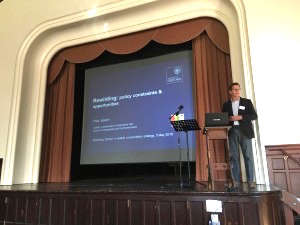Rewilding Britain: Ecotourism and economic diversification
140 delegates gathered on the 5th May 2016 at Charlton Down Village Hall, near Dorchester to discuss and explore the application of rewilding concepts to Dorset co-hosted by Bournemouth University and the Dorset Wildlife Trust.
Dr Susanna Curtin explains as a commentator on wildlife tourism in Britain, this was an exciting event I couldn’t miss. It was a combined meeting between Bournemouth University and Dorset Wildlife Trust and its purpose was to debate the concept of ‘rewilding’; a term mostly associated with environmental campaigner George Monbiot and his book ‘Feral’ which celebrates the idea of ‘optimising the diversity of the web of life’.

‘Rewilding’ is an emotive and exciting new approach to conservation and land management. Its concepts are not entirely new. The romantic idea of getting back to nature has been around for a while but now its reality is gaining pace. We are now at an interesting junction based on the realisation that our use of natural resources, our carbon emissions, the loss of biodiversity and the decline in human mental and physical health are no longer sustainable. We have had an impact on our landscape in Britain for at least 7000 years. The RSPB’s report on the ‘State of Nature’ highlights the 58% decline in fauna and flora since the 1970s and how the United Kingdom has lost 44 million birds since 1966 and, historically, more large mammals, including wolves, lynx, bears, beavers, boars, moose, bison, and wolverines, than any other European country except Ireland. We live on a highly-developed island where nature and wilderness struggles to survive. Through advances in inter-disciplinary conservation science, we have realised just how degraded our ecosystems are, that there are multiple natures out there and that nature is worth conserving. But in order to do this, we have to develop exciting new possibilities and visions; we have to rethink our relationship with nature.
The day’s speakers lay testimony to these possibilities: Professor Paul Jepson from the Conservation Governance Lab gave a high level policy overview on the importance of getting the concept of ‘rewilding into the next biodiversity strategy; of ‘kicking on’ beyond traditional conservation and agricultural policies. He highlighted the remarkable immersive shift in the way that we engage with nature; particularly the rise in thrill seeking outdoor sports and recreation: climbing, mountain biking, walking, hiking, cycling, kayaking, photography and travel; bringing the public closer to nature and wildlife all the time. This creates opportunities for new landscape economies, news ways of managing land and conservation, and from my part the benefits of Britain’s wildlife tourism opportunities.
Most people associate rewilding as bringing back keystone species such as beavers, wolves and bears but Dr Chris Sandom of the University of Sussex spoke of putting rewilding in practice; of small steps to restore natural processes such as using beavers for structural river engineering to increase water storage and prevent flooding, restoring natural hydrology and even strange inventions for urban seed dispersal. He spoke of ‘passive’ rewilding; of setting up a space and abandoning it to nature watching biodiversity creep back in. What an amazing resource this could be for wildlife tourism: butterflies, wild flowers, dragonflies, birds and beavers.
In fact Matt Heard gave an account of the rewilding project at Knepp Estate, Sussex, which restored their historic deer park, and are in the process of reintroducing grazers such as Exmoor ponies, long horned cattle, Oryx, wild boar and red and fallow deer. They have plotted the change from agricultural fields to scrubland over a period of five to six years and with it the changes in floral composition.
On top of this they have reinstated the natural watercourse of the river Adur to produce natural meanders, ponds, water botanicals, amphibians and dragonflies. Now Knepp estate is a biodiversity hotspot with purple emperor, nightingale, Bechstein’s bats, cuckoos, turtle dove and woodcock; all of which support a thriving high-end glamping and wildlife safari business. This is attracting a growing number of visitors which support and diversify Knepp’s income, making ecotourism a key profit centre. I left the event uplifted and optimistic for Britain’s countryside and excited about the possibilities.
For anyone interested in pursuing research on the opportunities of rewilding and ecotourism please contact me at scurtin@bournemouth.ac.uk or visit my website http: www.rewildingjourneys.com